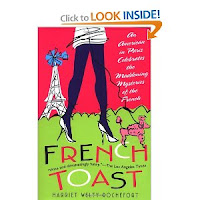Dateline: Paris, Boulevard St-Germain
This morning at 10:30am Paris Time several seasoned journalists — at least one of them a hack and a ham — were seen entering the escutcheoned, hallowed halls of the Political Sciences faculte’ of the University of Paris on the Left Bank’s chic Boulevard Saint-Germain. “Sciences Po”, as Parisians call it, is a prestigious and authentic French university department. It is not a foreign counterpart or counterfeit of the kind sold at Paris airports. A riveting session of natter, recollection, prognostication, and speculation ensued, lasting until noon.
5Ws
The “what” “when” “why” “where” and “who” of feature writing — specifically, writing about Paris — were the subject. The format: an informal Q&A-cum-talk organized by longtime Paris writer Harriet Welty Rochefort, author of the rib-tickling memoir French Toast (and other bestsellers).
The speakers were yours truly — the seasoned hack-ham of the trio — and the outstanding, longtime magazine editor Judith Fayard, currently of France Today.
Bespectacled but benign, Welty Rochefort, dressed in her patented, elegant, businesslike, darkly serious pantsuit, attacked the blackboard with confident strokes. The diminutive but charismatic Fayard discoursed with her usual flair, revealing to the eager assembly the secrets of the trade. These included not only the 5Ws of good journalism, but also the current keys to successful submission in the age of the Internet. (We’re talking about the submission of articles written on spec, nothing to do with S&M, editor’s note).
Both Welty Rochefort and Fayard offered genial and pithy advice to the dozen or so budding reporters perched around the classroom. Most of them were and are American, and all but one were and remain female. Yours truly punned and blathered about the joys, trials, tribulations and continuing mysteries of how to earn a living with screen and keyboard. (Clearly making a living would be easier with a sword; look at the arms dealers…). Downie had brought several props, including arcane newspaper clippings. He shared his latest books for perusal.
Downie later admitted that he was uncertain whether the students had ever seen a physical book; several students seemed intrigued or baffled by the physicality of the objects on display. Others were seen reaching for their hand-held devices; their intent was unclear. Downie speculated that they were checking the Internet to make sure that the books and their author actually existed.
Revealingly, not a one of the charming, beardless youths had purchased a newspaper that morning. Granted, several inky masses of folded newsprint (including the European edition of the Wall Street Journal) were available gratis to those taking the course.
More perplexing, only 2 or perhaps 3 (Downie is par-blind after all and could barely see the assembled company) of the youngsters raised their manicured hands when asked if they’d read a newspaper that morn. (Admittedly, Downie did not notice whether the sole male student had manicured his hands).
The kicker: no wonder printed periodicals, newspapers, magazines and books are disappearing faster than the macaroons at McDonald’s. (Yes, McDonald’s in France serves macaroons, made by the same confectioner that supplies at least one of Paris’ leading tea salons and pastry shops!).
Post script: next year I might sign up for Harriet’s course, and finally learn how to write about Paris. After ten books (who’s counting) and umpteen articles, it would be high time. In the meantime, I will continue to enjoy inky fingers in the morn, radio news, and hand-held, subversive, printed devices known as books.



Be First to Comment